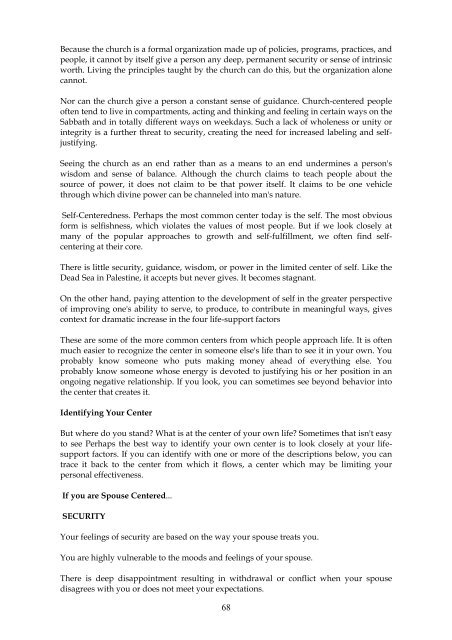Covey - The 7 habits of highly effective people
Create successful ePaper yourself
Turn your PDF publications into a flip-book with our unique Google optimized e-Paper software.
Because the church is a formal organization made up <strong>of</strong> policies, programs, practices, and<br />
<strong>people</strong>, it cannot by itself give a person any deep, permanent security or sense <strong>of</strong> intrinsic<br />
worth. Living the principles taught by the church can do this, but the organization alone<br />
cannot.<br />
Nor can the church give a person a constant sense <strong>of</strong> guidance. Church-centered <strong>people</strong><br />
<strong>of</strong>ten tend to live in compartments, acting and thinking and feeling in certain ways on the<br />
Sabbath and in totally different ways on weekdays. Such a lack <strong>of</strong> wholeness or unity or<br />
integrity is a further threat to security, creating the need for increased labeling and selfjustifying.<br />
Seeing the church as an end rather than as a means to an end undermines a person's<br />
wisdom and sense <strong>of</strong> balance. Although the church claims to teach <strong>people</strong> about the<br />
source <strong>of</strong> power, it does not claim to be that power itself. It claims to be one vehicle<br />
through which divine power can be channeled into man's nature.<br />
Self-Centeredness. Perhaps the most common center today is the self. <strong>The</strong> most obvious<br />
form is selfishness, which violates the values <strong>of</strong> most <strong>people</strong>. But if we look closely at<br />
many <strong>of</strong> the popular approaches to growth and self-fulfillment, we <strong>of</strong>ten find selfcentering<br />
at their core.<br />
<strong>The</strong>re is little security, guidance, wisdom, or power in the limited center <strong>of</strong> self. Like the<br />
Dead Sea in Palestine, it accepts but never gives. It becomes stagnant.<br />
On the other hand, paying attention to the development <strong>of</strong> self in the greater perspective<br />
<strong>of</strong> improving one's ability to serve, to produce, to contribute in meaningful ways, gives<br />
context for dramatic increase in the four life-support factors<br />
<strong>The</strong>se are some <strong>of</strong> the more common centers from which <strong>people</strong> approach life. It is <strong>of</strong>ten<br />
much easier to recognize the center in someone else's life than to see it in your own. You<br />
probably know someone who puts making money ahead <strong>of</strong> everything else. You<br />
probably know someone whose energy is devoted to justifying his or her position in an<br />
ongoing negative relationship. If you look, you can sometimes see beyond behavior into<br />
the center that creates it.<br />
Identifying Your Center<br />
But where do you stand? What is at the center <strong>of</strong> your own life? Sometimes that isn't easy<br />
to see Perhaps the best way to identify your own center is to look closely at your lifesupport<br />
factors. If you can identify with one or more <strong>of</strong> the descriptions below, you can<br />
trace it back to the center from which it flows, a center which may be limiting your<br />
personal <strong>effective</strong>ness.<br />
If you are Spouse Centered...<br />
SECURITY<br />
Your feelings <strong>of</strong> security are based on the way your spouse treats you.<br />
You are <strong>highly</strong> vulnerable to the moods and feelings <strong>of</strong> your spouse.<br />
<strong>The</strong>re is deep disappointment resulting in withdrawal or conflict when your spouse<br />
disagrees with you or does not meet your expectations.<br />
68


